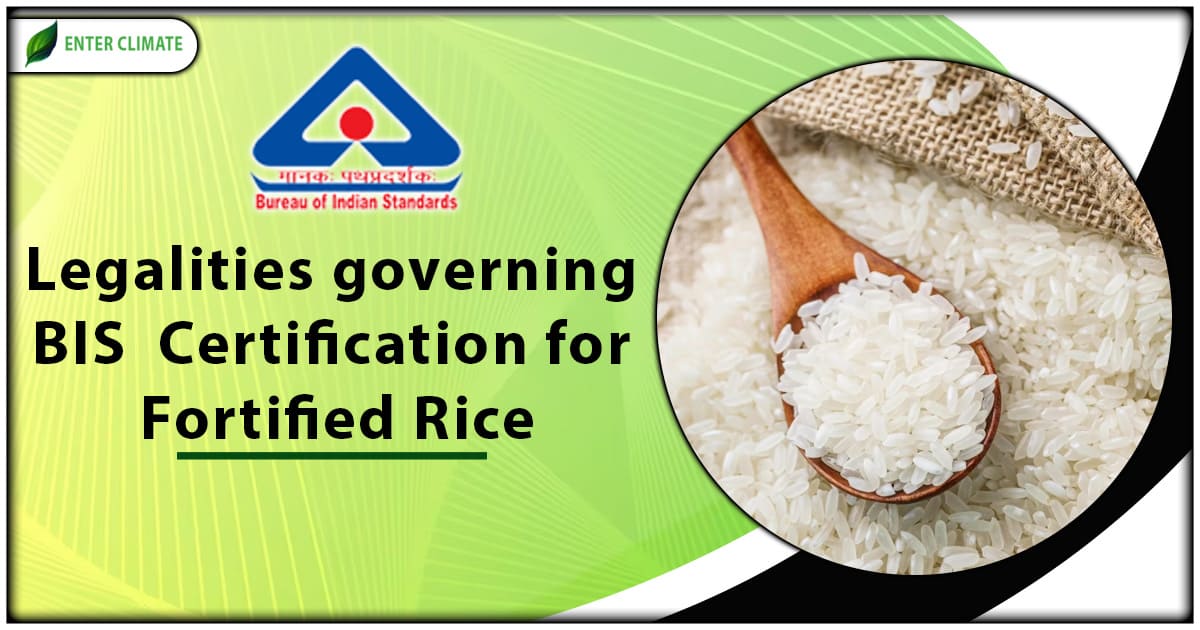Legalities Governing BIS Certification for Fortified Rice
 27 Jul, 2023
27 Jul, 2023 
Rice is the staple food consumed by Indians. It is striking to see that even after being the 2nd largest rice producer, India faces malnutrition issues among women and children. Every second woman in the country is anaemic, and the growth of every third child is stunted due to malnutrition. To combat the severe problem, India’s Prime Minister, Shri Narendra Modi, during his speech on August 15 2021, announced that fortification of rice will be mandatory in all social security schemes by 2024. The Ministry of Consumers Affairs issued the new regulations for BIS Certification for fortified rice after the BIS Standards were announced for Fortified Rice Kernels (FRK) and Fortified Rice (FR)[1] in 2022. This article will explain the BIS specifications for Fortified rice and the SOPs announced for the entities involved in manufacturing, mixing and distributing fortified rice.
The fortification process involves coating the rice kernels with a powdered blend containing specific nutrients. Fortified rice kernels are rice grains that have undergone a process of enrichment with essential vitamins and minerals to address nutrient deficiencies in populations. Common nutrients added to fortified rice include Iron, Zinc, Folic Acid, Vitamin A, and some other micronutrients. Therefore, to ensure the quality and safety of fortified rice distributed through various social security programmes and in the open market, specification for BIS Certification for fortified rice was formulated in 5products, including the product itself. An order passed by the government has made BIS Certification for fortified rice compulsory for the following.
| Area of Specification | Specification Standard | Parameters covered |
| Fortified Rice (FR) | IS 17780: 2021 | Physicochemical, nutritional and packaging requirements of FR. Test methods for fortified rice Levels of the mandatory fortificants. Covers Good Manufacturing Practices |
| Fortified Rice Kernels (FRK) | IS 17782: 2021 | Physical quality, cooking quality, nutritional and packaging requirements for FRK Test methods of fortified rice kernels Provides Good Manufacturing Practices for FRK |
| Vitamin & Mineral Premix for Manufacturing FRK | IS 17781: 2021 | Provides quality specifications and test methods for vitamin & mineral premix for manufacturing FRK. Packaging and storage requirements for vitamin & mineral premix. |
| Equipment for the Manufacture of FRK | IS 17853: 2022 | Prescribes constructional requirements and performance requirements of the various machinery used for the production of FRK. |
| Equipment for the Manufacture of FR | IS 17854: 2022 | Constructional requirements and performance requirements of the blending unit Types of process for the manufacturing of FR. |
SOPs for Fortified Rice Manufacturers and Fortified Rice Kernel Manufacturers
The Quality Control (QC) order for FRK and FR aims to achieve the desired objectives stated above. All stakeholders involved in domestic food supply chain/social security programmes are being encouraged to ensure the quality standards of FRK and FR.
SOPs for Fortified Rice manufacturers
- All fortified rice manufacturers must obtain +F endorsement on the Food Safety Compliance Systemportal. This +F logo must be used per the FSSAI standards and gazette notification related to BIS Certification for fortified rice.
- Rice mills must comply with all Good Manufacturing Practices (GMP) and food safety guidelines according to schedule 4 of the FSS Regulations, 2011 and maintain HACCP.
- The manufacturing & food safety practices must comply with statutory and regulatory guidelines of the state/region where the product is manufactured.
- Standardisation practice must be ensured by the manufacturer by conducting FRK Count for every batch of FRK received by sampling 10% of the bags.
- Maintain a batch-wise record of FRK procurement, packaging protocols and continuous inventory of fortificants used in the manufacturing or packing process and the source of its procurement.
- Millers should have an Automatic Blending Machine having the standards prescribed by BIS under the BIS Certification for fortified rice to ensure accurate blending at a ratio of 1:100.
- During the production of fortified rice, quality checks should be done through blending efficiency tests conducted hourly, and proper records should be maintained.
- Certification by a notified food laboratory that the fortified rice complies with the provisions of the Act and regulations and standards
- All bags of fortified rice offered for procurement to the procuring agencies must bear the blue-coloured +F logo stencilled on it, as well as on rexin slips and regulatory instructions suggested by FSSAI.
SOPs Fortified Rice Kernel Manufacturer/ Supplier
- FRK manufacturer must have a FSSAI Registration for food category 99.5 and certification such as ISO: 22000 etc.
- Raw material/fortificants/ingredients used in the manufacture of FRKs must comply with the standards laid down in the draft FSSAI standards, June 2022.
- FRK must maintain certification by a notified food laboratory that the fortified rice kernel complies with the provisions of the Act and regulations and standards.
- FRK manufacturer should procure the premix for FRK production from the premix supplier/vendors having valid FSSAI license of 99.5 food category and empanelled with FSSAI.
- They should also receive a certificate of analysis (CoA) of the premix for micro-nutrients and microbiological levels adhering to FSSAI standards from FSSAI-notified, NABL-accredited labs by the premix manufacturer/supplier.
- In addition, the details of the premix, like the date of manufacturing, date of packaging, date of expiry, etc., should be sought and recorded by the FRK manufacturer.
- The SOP formulated by FSSAI for FRK production must be strictly followed. To avoid micro-nutrient loss during procurement to distribution, the level of added micro-nutrients/fortificants should have at least the mean value of the range suggested by FSSAI/BIS as per IS 17782.2021 “Fortified Rice Kernels – Specification”.
- FRKs are to be blended with conventional rice in the ratio of 1:100 since all millers across the country have been trained and currently practising the use of a 1:100 blending ratio.
- Potable water should be used to mix ingredients (complying with Indian Standards for Potable Water Standards IS 10500: 2012 with up-to-date amendments).
- Equipment for Manufacture of Fortified Rice Kernels specification’ should be adopted by the FRK manufacturers to maintain grain density, shape, size, etc.
- The colour and texture of FRK are to be aligned with the locally procured/consumed varieties in a particular State/Area.
- FRK manufacturer must ensure the packaging protocols of FRK as per the information required under the Legal Metrology (Packaged Commodities Rules 2011, and the Food Safety and Standards (Labelling & Display) Regulations, 2020.
- FRK manufacturers will strictly maintain the records of CoAs of FRK, Premix, and quality checks for all raw materials for parameters defined in draft FSSAI standards, June 2022.
Note: Every manufacturer and packer of fortified rice has to give an undertaking on Quality Assurance (QA) and submit evidence of steps taken in this regard. The undertaking must be given twice a year.
Good Manufacturing Practices under BIS Certification for fortified rice
For obtaining and ensuring BIS Certification for fortified rice, the applicant must ensure that the construction materials for the facility should be safe, non-toxic, and approved for use in a food processing facility. All equipment, walls, floors, doors, windows, and fixtures must meet approved standards. The plant layout should be such that it can avoid accumulating dirt and can be easily cleaned and sanitised. Adequate numbers of hand-washing areas should be constructed in the facility to facilitate good hygiene practices.
Conclusion
The government aims to distribute fortified rice in a phased manner through all central government schemes by 2024. Rice fortification can potentially create a positive public health impact, particularly in regions where rice consumption is widespread. It is the reason why there is strict monitoring of the establishments involved in the rice fortification process. The Centre has kick-started the phase-II distribution of fortified rice to high-burden districts via ration shops from April 1, 2023, and 90 districts have been covered out of 291 so far. The provisions of BIS Certification for fortified rice, quality control and compliance monitoring are stringent and open to amendments from time to time. It is therefore recommended for existing as well as upcoming businesses take the assistance of top BIS licencing experts to meet all the new BIS-related legalities made applicable to them.
FAQs
Under the Compulsory Registration Scheme of BIS, the manufacturers of those products listed under the CRS must obtain the BIS certification mandatorily.
Although BIS certification for certain products is voluntary in many cases, the Government of India has made it mandatory for identified products considering public health.
To ensure the safety and quality of fortified rice distributed through various social security programmes and in the open market, BIS has formulated specific standards for five products involved in rice fortification.
BIS certification for fortified rice kernels aims to ensure physical quality, cooking quality, nutritional and packaging requirements, and test methods of fortified rice kernels and also provides Good Manufacturing Practices for the product.
As per FSSAI, Fortified rice kernels (FRKs) will now be treated as premix under Category 99 of the Food Categorisation Code as it is a premix sub-category 99.5 – nutrient and its preparations.
According to FSSAI standards, 1 kg of fortified rice (FR) should have an iron contentof 28 mg-42.5 mg, a folic acid content in the range of 75-125 micrograms and Vitamin B-12 levels in a range of 0.75-1.25 microgram.
BIS is responsible for the harmonious development of standardisation activities, quality certification, marking and labelling of goods.
BIS Certification or registration, issued by the Bureau, provides an assurance of the quality, reliability and safety of products in accordance with Indian Standards.
The timeline for the grant of a licence in FMCS is a maximum of 180 days. The licence is initially granted for at least one year and up to two years.
FMCS is a scheme under which the Bureau of Indian Standards grants a BIS license to a foreign manufacturer for using the BIS mark on their product to show their conformity with Indian Standard(s). Products covered under quality control order must conform to the Indian Standard. This rule makes the certificate mandatory to import those identified products in India.
Read our Article: Eligible Products Under The PLI Scheme For Food Processing Industry
Categories
Latest Post
Air pollution Dispersion Modeling
Natural Disaster Risk Assessment
Endangered Species Protection
Aquifer Recharge Project
Sustainable Sanitation Solutions














